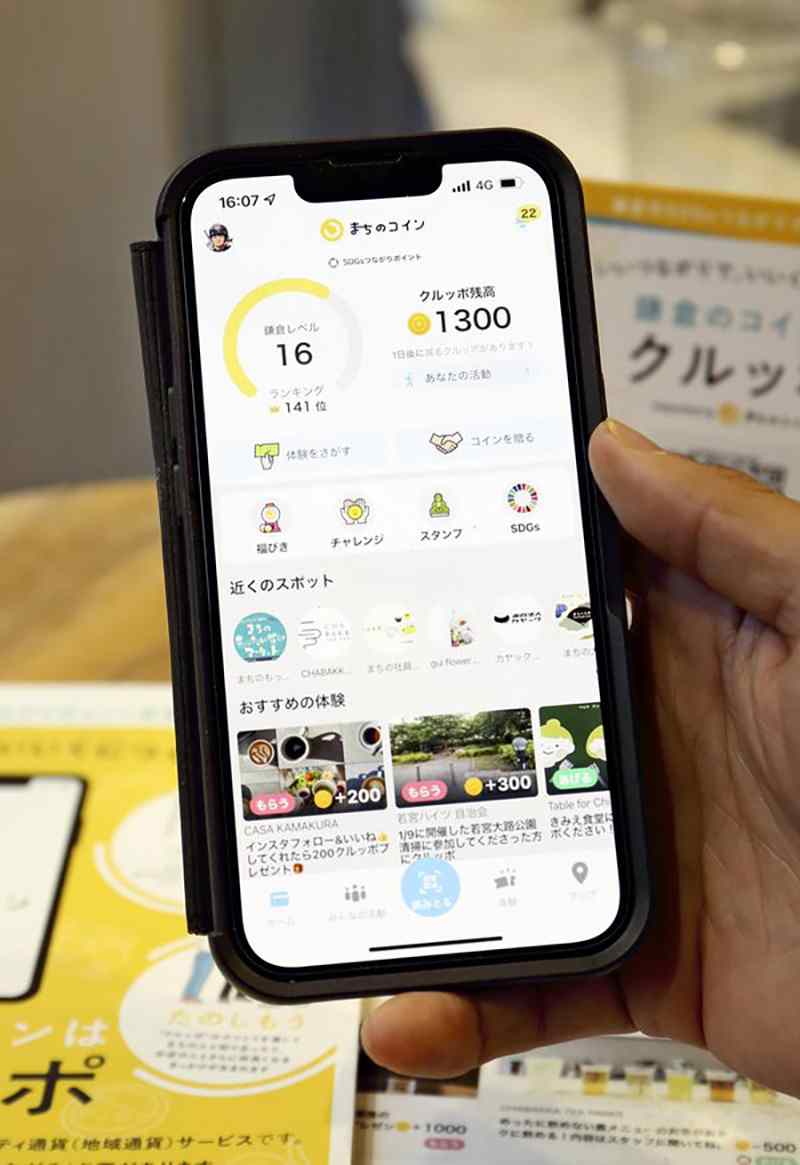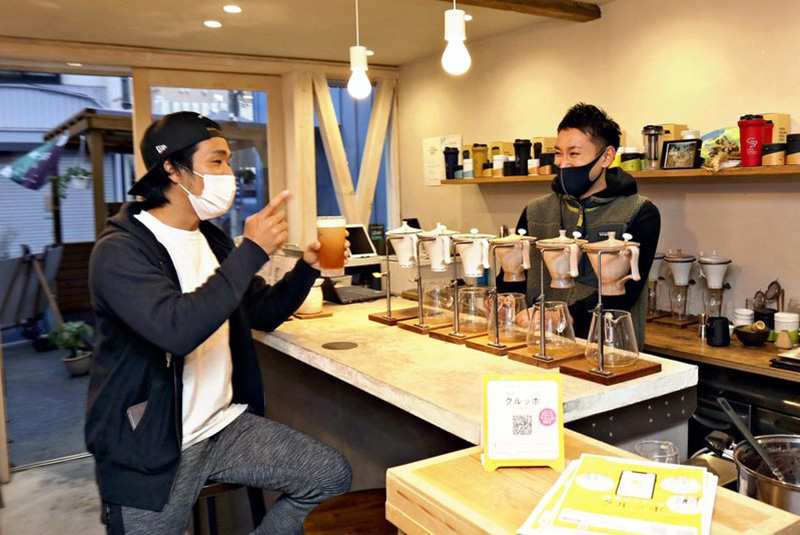
A smartphone screen showing the Kuruppo local currency
11:17 JST, February 8, 2022
New developments are afoot in the world of local currencies, with people increasingly placing more importance on solidarity with their area rather than simply chasing down a good deal.
Local currencies are usually issued by local governments, shopping streets or NPOs, among others, to exchange for goods or services within a certain area.
Over recent years, there has been a dip in the popularity of traditional types of local-use monies, in which users receive a financial bonus when purchasing such currencies with cash.
Now, however, currencies obtainable via interactions with locals are becoming more widespread.
Local vitalization
“Try to guess which type of tea this is,” said Ken Miura, 36, owner of Chabakka, a Japanese tea shop in Kamakura, Kanagawa Prefecture, that provides a tea-tasting service for users of the local currency, Kuruppo.
Customers purchase a tea, and if they guess the brand correctly they receive 500 Kuruppo. If they guess wrong, however, they pay 500 Kuruppo to the shop.
One 30-year-old regular mistook a red hojicha for Japanese black tea, but the experience led to a pleasant chat over tea during a worktime break. “I moved here because of the pandemic,” he said. “Kuruppo helped me get to know the area.”
The city launched Kuruppo in January last year. Now, local restaurants and nature conservation groups number among the participants. People can receive Kuruppo through such methods as promoting restaurants on social media or cleaning Yuigahama beach. The Kuruppo can then be exchanged for products and services at shops.
Presently, about 200 businesses and organizations and about 5,000 consumers use the currency. “Promoting face-to-face exchanges helps vitalize the community,” said Shozo Uchida, manager of the city’s planning division.
Pandemic-induced decline
Senshu University Prof. Rui Izumi, who studies local currencies, says the number of local-use monies peaked at over 300 in around 2005, after first appearing in the 1990s. However, almost 60% were suspended or canceled within three years. As of the end of 2020, the number had declined to 184.

A customer who used Kuruppo to buy a tea-tasting experience at Chabakka in Kamakura, Kanagawa Prefecture, is seen chatting with the owner, Ken Miura, on Jan. 11.
Inability to grow the user base is among the reasons for the failure of such schemes. In 2013, a group that included five municipalities on remote islands in Nagasaki Prefecture issued a currency, Shimatoku Tsuka, to attract tourists. For a ¥5,000 charge, island visitors would receive ¥6,000 in digital currency. However, a decline in tourism due to the coronavirus pandemic has strained local government finances and the group has decided to suspend the currency at the end of this fiscal year.
Kozan Points, issued by Kasumigaura, Ibaraki Prefecture, failed to attract participating businesses and users, and ended its run after three years in October. “Events were canceled due to the pandemic, which reduced opportunities to use the currency that was also competing against private electronic payment services,” a city official said.
Fan mentality
Newer local currencies, meanwhile, are trying to stimulate a fan mentality by providing experiences and services unique to particular regions.
Tokyo’s Akihabara district launched the Akiko local currency on Jan. 26, targeting fans of the area’s unique culture. Customers paying in Akiko can have a staffer at a maid cafe cast a special “spell” on food or drink they order, have their plastic models put on display, or have lunch with the owner of a plastic model shop to talk about the hobby.
“We want to convey all that’s great about Akihabara and bring back visitors lost due to the pandemic,” said a representative of the company that manages Akiko.
Prof. Izumi said, “To ensure a local currency isn’t just a temporary thing, it’s important to instill in users a desire to support their region.” Izumi also stressed that local currencies should add value to a region’s attractiveness in ways that cannot be measured with money.
Top Articles in Business
-

Prudential Life Insurance Plans to Fully Compensate for Damages Caused by Fraudulent Actions Without Waiting for Third-Party Committee Review
-

Narita Airport, Startup in Japan Demonstrate Machine to Compress Clothes for Tourists to Prevent People from Abandoning Suitcases
-

Japan, U.S. Name 3 Inaugural Investment Projects; Reached Agreement After Considerable Difficulty
-

Toyota Motor Group Firm to Sell Clean Energy Greenhouses for Strawberries
-

SoftBank Launches AI Service for Call Centers That Converts Harsh Customer Voices into Softer Voices
JN ACCESS RANKING
-

Japan PM Takaichi’s Cabinet Resigns en Masse
-

Japan Institute to Use Domestic Commercial Optical Lattice Clock to Set Japan Standard Time
-

Israeli Ambassador to Japan Speaks about Japan’s Role in the Reconstruction of Gaza
-

Man Infected with Measles Reportedly Dined at Restaurant in Tokyo Station
-

Videos Plagiarized, Reposted with False Subtitles Claiming ‘Ryukyu Belongs to China’; Anti-China False Information Also Posted in Japan






















